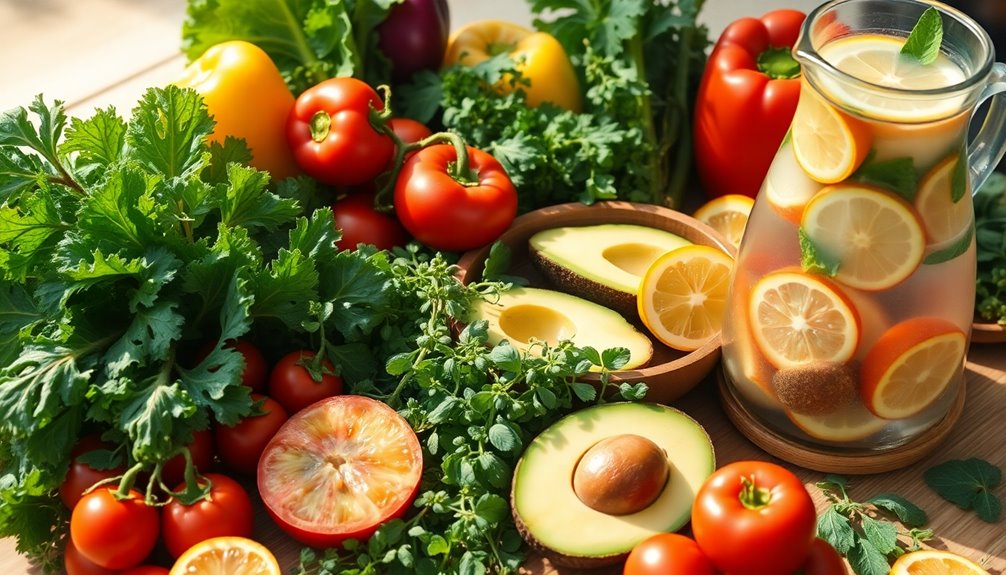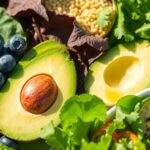A vegan diet focuses on whole plant foods and can offer numerous health benefits, like lower risks of chronic diseases, improved heart health, and increased energy levels. You'll find that it boosts your intake of essential nutrients and antioxidants from fruits, vegetables, grains, and legumes. While enjoying these benefits, it's also essential to make sure you get key nutrients such as vitamin B12 and omega-3s, often found in fortified foods or supplements. Shifting may pose some challenges, but with support and meal planning, it's entirely manageable. Stick around, and you'll discover more tips and insights to enhance your vegan journey.
Key Takeaways
- A vegan diet lowers the risk of chronic diseases, promotes heart health, and aids in weight management through nutrient-rich plant foods.
- Key nutrients in a vegan diet include plant-based proteins, vitamin B12, omega-3 fatty acids, calcium, and vitamin D, often requiring careful planning.
- The environmental benefits of a vegan diet include reduced greenhouse gas emissions, water conservation, and preservation of biodiversity.
- Ethically, a vegan diet supports animal welfare, encourages cruelty-free living, and promotes sustainable farming practices.
- Transitioning to a vegan diet can be easier with meal planning, community support, and gradual changes to incorporate diverse plant-based foods.
Benefits of a Vegan Diet
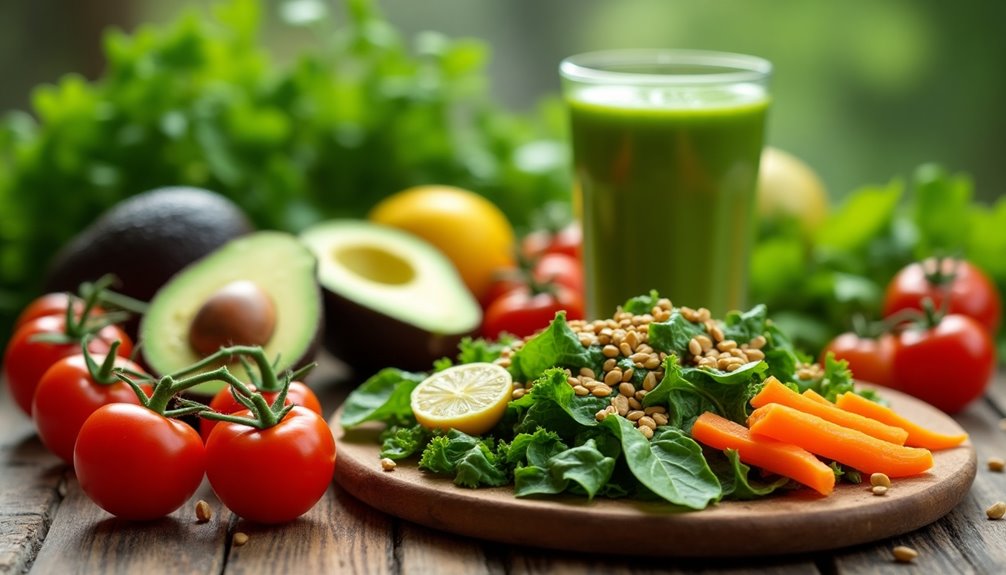
When it comes to choosing a diet, many people are increasingly turning to veganism for its numerous health benefits. Adopting a vegan diet can lead to lower risks of chronic diseases such as heart disease, type 2 diabetes, and certain cancers. Studies show that vegans often enjoy lower cholesterol levels and blood pressure, contributing to overall heart health. By focusing on fruits, vegetables, whole grains, and legumes, you're not just nourishing your body; you're also boosting your intake of essential nutrients and antioxidants. Additionally, a plant-based diet is known to reduce the risk of diabetes and promote overall health through its rich nutrient content.
Moreover, the sustainability impact of a vegan diet is significant. With the rising concern about climate change and environmental degradation, many are drawn to plant-based eating as a way to reduce their ecological footprint. Livestock farming is a major contributor to greenhouse gas emissions, deforestation, and water consumption. By choosing veganism, you're actively participating in a movement that promotes environmental stewardship and reduces resource depletion.
Joining the vegan community can also offer a sense of belonging, as you connect with like-minded individuals who share your values regarding health and sustainability. Whether you're dining with friends or participating in local events, being part of this community can enhance your journey. Ultimately, embracing a vegan diet not only benefits your health but also aligns with a greater purpose of caring for our planet, making it a fulfilling choice for many.
Key Nutrients to Consider
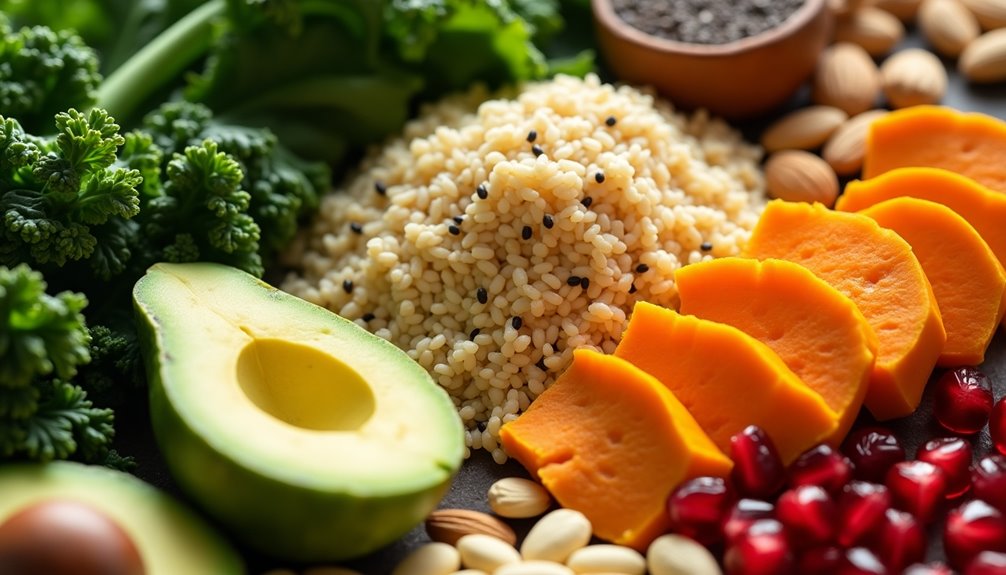
Shifting to a vegan diet can sometimes leave you wondering about essential nutrients that might be lacking. One of the main concerns is protein. While many people associate protein primarily with animal products, you can find plenty of plant-based protein sources. Foods like lentils, chickpeas, quinoa, and tofu are excellent choices. Incorporating a variety of these sources into your meals ensures you're getting all the necessary amino acids your body needs.
Another nutrient to keep an eye on is iron, as plant-based sources contain non-heme iron, which isn't absorbed as effectively as heme iron found in animal products. To enhance your iron absorption, consider pairing iron-rich foods, such as beans and spinach, with vitamin C-rich options like bell peppers or citrus fruits. This combination can notably improve your body's ability to take in iron.
Don't forget about other nutrients too! Vitamin B12, omega-3 fatty acids, calcium, and vitamin D are crucial for your overall health. You might want to explore fortified foods or consider supplements, especially for B12, as it's mainly found in animal products. Additionally, incorporating whole food sources of protein into your diet can help you avoid the potential downsides of processed protein powders.
Tips for Transitioning
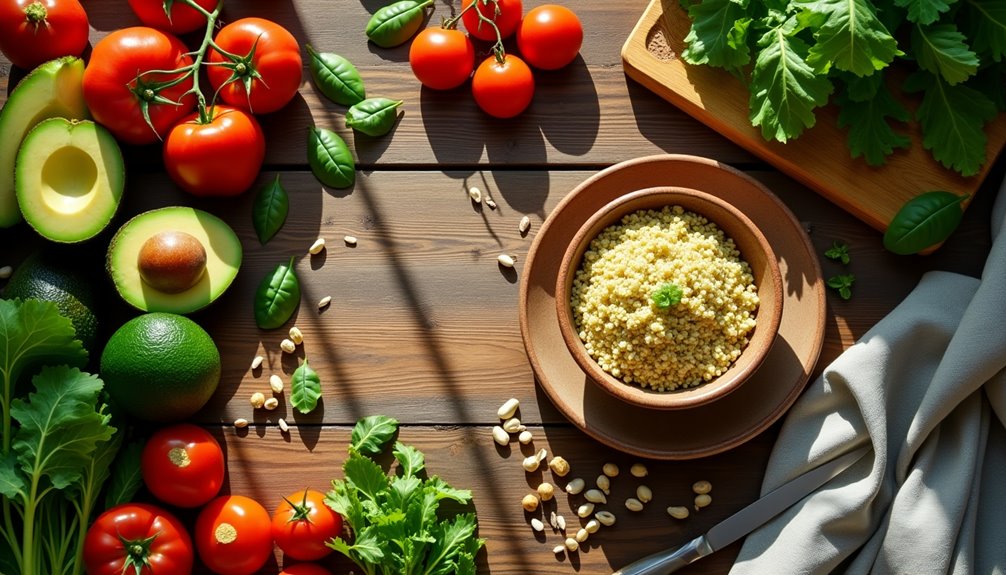
Switching to a vegan diet can feel overwhelming initially, but with a thoughtful approach, it becomes manageable and rewarding. You're not alone in this journey; many people find success with a few simple strategies. Meal planning is key. By preparing your meals ahead of time, you can guarantee you get the nutrients you need while avoiding the temptation of non-vegan options.
Here are three tips to help you shift smoothly:
- Explore Protein Sources: Including a variety of plant-based protein sources in your diet is crucial. Consider legumes, beans, lentils, tofu, and quinoa. These foods not only offer protein but also essential amino acids that your body requires.
- Start Gradually: You don't have to go vegan overnight. Think about beginning by designating one day a week as "Meatless Monday" or slowly replacing certain meals with vegan options. This approach allows your palate to adjust, making the change feel less intimidating.
- Join a Community: Whether it's online forums, local groups, or social media, connecting with others who share your journey can be incredibly beneficial. You'll find support, tips, and even inspiration for meal ideas that make your switch enjoyable and fulfilling. Additionally, embracing a plant-based diet can significantly reduce greenhouse gas emissions, making your transition not only beneficial for your health but also for the environment.
Delicious Vegan Recipes
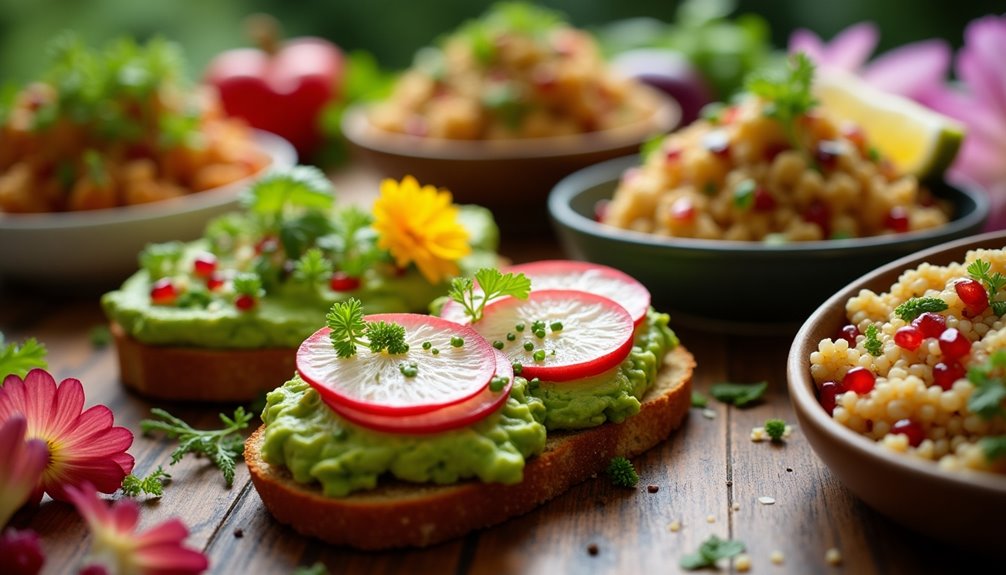
What's more satisfying than a hearty, flavorful meal that aligns with your values? Embracing a vegan diet opens up a world of delicious recipes that aren't only kind to animals but also packed with nutrition. By focusing on plant-based proteins, you'll discover a variety of ingredients that can elevate your meals.
Start your culinary adventure with a chickpea curry. Chickpeas are a fantastic source of plant-based protein, offering about 15 grams per cup. Sauté garlic, onions, and your favorite spices, then add canned tomatoes and chickpeas for a warm, inviting dish. Serve it over quinoa, another protein-rich option that complements the curry beautifully.
For a delightful lunch, whip up a vegan quinoa salad. Combine cooked quinoa with black beans, corn, diced bell peppers, and a zesty lime dressing. This colorful dish not only looks great but also provides a balanced meal with essential amino acids and fiber.
Don't forget about dairy alternatives. Try using almond or oat milk in your smoothies for a creamy texture without the dairy. You can also make a cashew cream to drizzle over your favorite pasta dishes, adding a rich flavor without compromising your values.
These recipes showcase how easy and enjoyable a vegan lifestyle can be. By experimenting with different ingredients, you're not just nourishing your body; you're also creating a sense of community among fellow plant-based eaters. Additionally, you can explore healthy recipes and meal ideas that can help you maintain a balanced diet. So gather your friends, share these meals, and enjoy the journey together!
Common Misconceptions
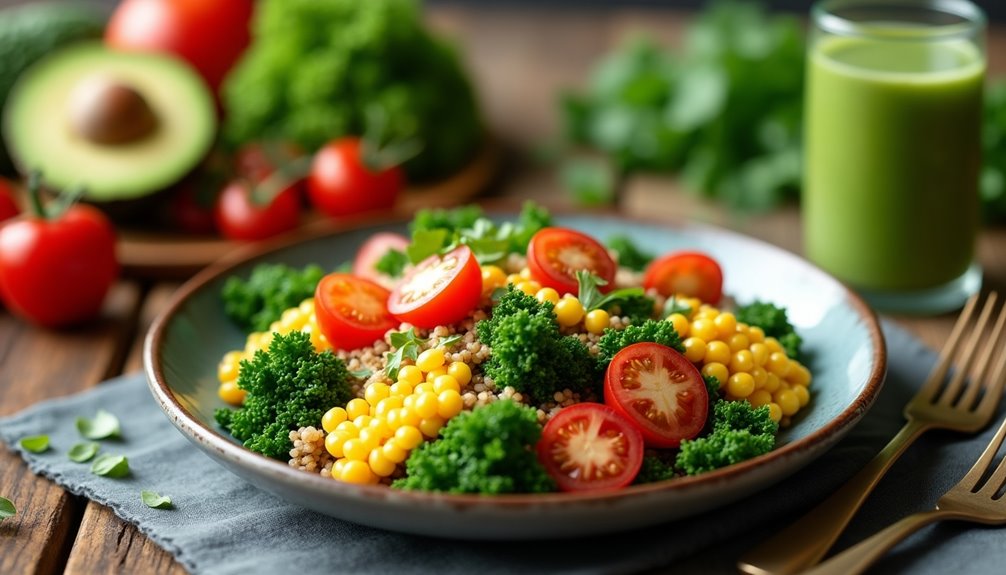
Many people hold misconceptions about a vegan diet, often stemming from outdated beliefs and stereotypes. You might hear that vegans struggle to get enough protein or that their diets lack variety. Let's clear up some of these misunderstandings.
- Protein sources: It's a common myth that vegans can't get enough protein. In reality, there are numerous plant-based protein sources available. Foods like lentils, chickpeas, quinoa, and tofu provide ample protein to meet your needs. Many athletes thrive on vegan diets, proving that you can build muscle without animal products.
- Nutritional deficiencies: Some believe that a vegan diet is inherently unhealthy. While it's true that you need to be mindful about nutrients like B12, iron, and omega-3s, a well-planned vegan diet can be incredibly nutrient-dense. By incorporating a variety of whole foods, you can easily meet all your nutritional requirements. Additionally, many people find that they can enjoy delicious, easy-to-make recipes that are both satisfying and healthy.
- Environmental impact: Another misconception is that veganism doesn't notably impact the environment. In fact, numerous studies show that plant-based diets have a lower carbon footprint compared to meat-based diets. By choosing vegan options, you contribute to reducing greenhouse gas emissions and conserving water.
Understanding these misconceptions can help you make informed decisions about your dietary choices. Embracing veganism doesn't mean sacrificing nutrition or variety; instead, it opens up a world of delicious, sustainable options.
Resources for Further Learning
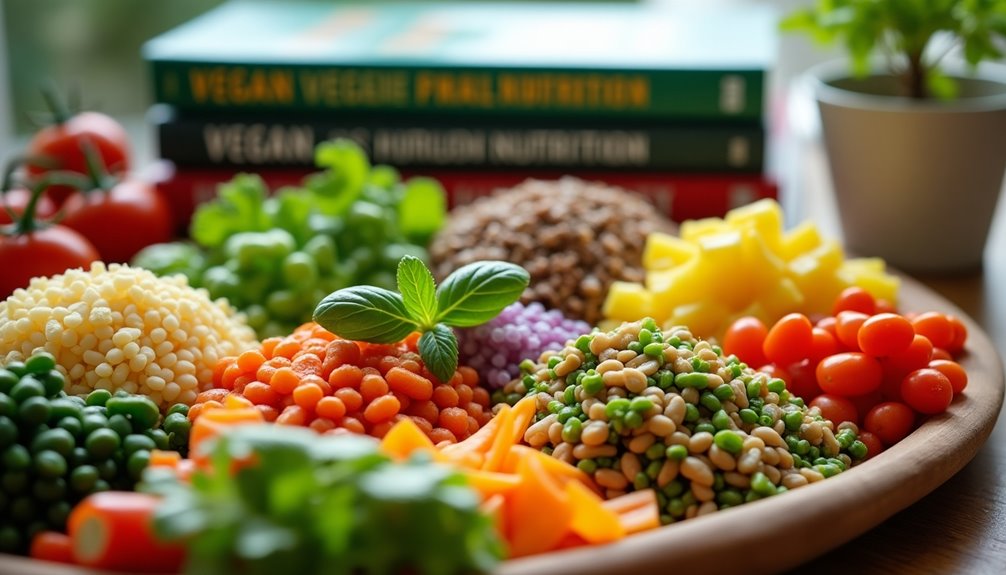
To deepen your understanding of veganism, it's helpful to explore a variety of resources that offer evidence-based information. Start with vegan documentaries, which provide insightful perspectives on the ethical, environmental, and health aspects of a plant-based lifestyle. Films like "Forks Over Knives" and "What the Health" can illuminate the benefits of veganism while addressing common misconceptions.
Cookbooks are another essential resource. They not only provide delicious recipes but also educate you about the nutritional aspects of a balanced vegan diet. Titles such as "Plenty" by Yotam Ottolenghi and "Veganomicon" by Isa Chandra Moskowitz offer diverse options that can make shifting to a vegan lifestyle enjoyable and fulfilling.
Engaging in online forums can also enhance your learning experience. Websites like Reddit and dedicated vegan communities allow you to connect with others who share your interests and concerns. You can ask questions, share experiences, and gain insights from seasoned vegans.
Lastly, don't overlook podcasts. They can be a fantastic way to absorb information while on the go. Shows like "The Rich Roll Podcast" and "Plant Based News" feature interviews with experts and discussions that explore various aspects of veganism. Additionally, understanding the scientific research behind dietary choices can provide a solid foundation for your vegan journey.
Frequently Asked Questions
Can a Vegan Diet Support Athletic Performance Effectively?
Absolutely, a well-planned diet can support your athletic performance effectively. Prioritizing macronutrient balance, ensuring you receive sufficient carbs, fats, and proteins, is crucial.
You can discover exceptional protein sources like legumes, nuts, seeds, and whole grains. These foods not only fuel your workouts but also assist in recovery.
How Does a Vegan Diet Impact Mental Health?
A balanced diet can greatly impact your mental health, enhancing cognitive function and emotional well-being. When you consume nutrient-rich foods, you provide your brain with vital vitamins and minerals, which can improve memory and focus. Additionally, a diet rich in whole foods can help stabilize your mood and reduce anxiety.
Paying attention to what you eat is crucial, as it directly influences how you feel and think each day.
Are There Vegan Options for Fast Food?
Ah, the noble quest for fast food that won't have you questioning your life choices. You'll find vegan options aplenty, like scrumptious vegan burgers that rival their meaty counterparts.
Don't forget about those tempting plant-based nuggets, perfect for dipping or munching on the go. Many chains now offer these delights, making it easier for you to indulge without sacrificing your values.
Fast food can be delicious, even if you're rocking a plant-based lifestyle!
Can Children Thrive on a Vegan Diet?
Yes, children can thrive on a well-planned diet that meets their nutritional needs. Prioritizing the provision of a variety of foods that support their growth patterns, including fruits, vegetables, whole grains, and protein sources, is important. Ensuring they receive sufficient vitamins and minerals, like B12 and iron, is vital. Seeking guidance from a nutritionist can assist you in developing a well-rounded meal plan, ensuring your child receives all the necessary nutrients for healthy development.
What Are the Environmental Impacts of a Vegan Diet?
The environmental impacts of dietary choices are significant. If you choose plant-based foods, you can help combat climate change by reducing greenhouse gas emissions associated with animal agriculture.
Additionally, a shift towards plant-based eating can lessen deforestation, as vast areas of forests are cleared for livestock farming.
Conclusion
Embracing a vegan diet can lead to improved health, environmental sustainability, and ethical living. By immersing yourself in nutrient-rich foods, experimenting with new recipes, and dispelling common misconceptions, you can enjoy a fulfilling lifestyle. Whether you're driven by health benefits, compassion for animals, or a commitment to lessen your carbon footprint, the decision is in your hands. Remember, every small change matters, and every meal is a chance to nourish your body and the planet. Jump right in and discover the benefits today!

